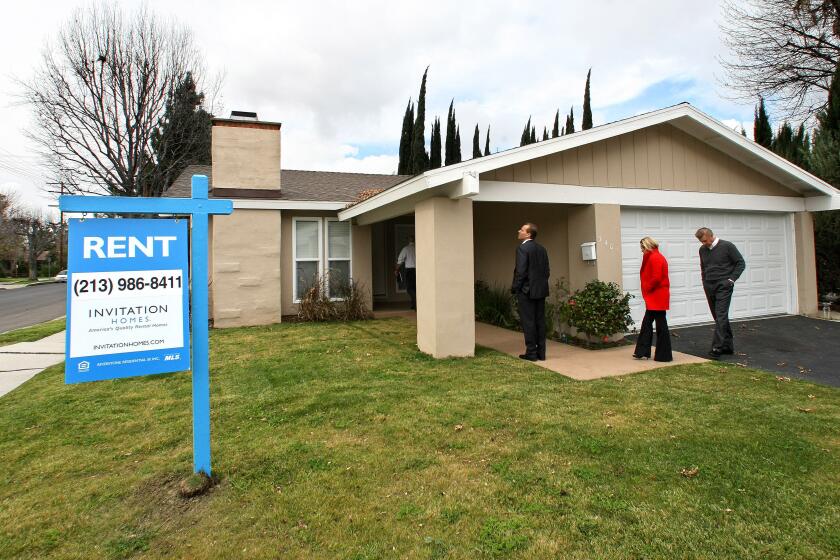Foreigners are buying into the California dream
THERE is a new pond emerging in which to fish for home buyers -- overseas.
As Southern California sales have stalled and home prices have slumped, realty agents here have geared up to help sellers tap into this market of buyers who come with pockets full of cash. Some local agents have adapted their websites for foreign buyers by adding multiple language translation options. Others have joined professional organizations to give themselves an international reach. One local agent has even offered to reimburse buyer travel expenses should a sale close.
About one-quarter of agents surveyed in a National Assn. of Realtors study last year said their business with buyers who principally reside in another country had increased in the previous five years. California was second in popularity, accounting for 16% of international purchases in the U.S. Florida was tops.
Foreigners purchase all types and sizes of properties; however, high-end estates, larger homes and condominiums in upscale areas are especially prized. These buyers also prefer properties that are bright, clean, ready to occupy and on large lots, experts say.
Locally, real estate brokers report an influx of buyers from Europe, the Middle East, Asia and Latin America. Specific countries include Brazil, China, France, Germany, Italy, the Netherlands, the Philippines, Russia and Spain, as well as Canada and Mexico.
The strength of foreign currencies against the U.S. dollar has been the “icing on the cake” of California’s appeal, said Greg Moesser, estates director at Prudential California Realty in Beverly Hills.
Desert and beachfront areas are both seeing their share of international shoppers seeking sunny vacation getaways.
George Colombotos, a real estate investor and partner in Casa Grande Enterprises, a luxury home design-build firm in Cathedral City, wasn’t surprised when a Canadian couple made an all-cash offer to buy a Rancho Mirage property he’d listed with a local broker. Another Canadian couple had bought a similar home, also for cash, that Colombotos had listed with the same broker several months earlier.
A stylish pair
Colombotos had purchased the two houses from a new-home builder. Both 4,000-square-foot houses were desert contemporary in style, each with a swimming pool and mountain view. The two houses sold -- one in September 2006, the other in February 2007 -- at a profit, he said, for about $1.7 million each.
Brokers advise sellers who want to tap into this market to hire a real estate agent who has proven international connections personally, through a company affiliation or both.
Prudential’s Moesser belongs to a network of brokers who specialize in high-priced properties, and his brokerage company has online and print advertising agreements that offer international exposure. Other major U.S. brokerage companies have overseas offices and advertising deals as well.
A strong Internet presence with an international flair, even if it’s only in English, is equally crucial because foreigners frequently familiarize themselves with U.S. housing markets online before they search for a specific property in person.
Some agents offer bilingual or multi-language translation options on their websites. The Realtors association study found that 15% of members surveyed were fluent in another language.
To attract Canadians, Ralph Haverkate, an associate broker with Tarbell Preferred Properties in Palm Desert, posted on his website an offer to reimburse them for travel expenses if they purchase a home, subject to certain limitations.
Experts recommend sellers interview several agents and ask such questions as: How many properties have you sold to international buyers? How many international buyers have you worked with? Which countries have you personally visited to cultivate clients and build relationships with foreign brokers? How will you market my home to foreign buyers? Will you advertise my home in any publications that have international readers and, if so, how frequently?
The compensation each agent pays foreign counterparts for referrals of buyers also makes a difference, according to Danielle Carlson, chief executive of World Star Realty in Orange and president of the California Council of the International Real Estate Federation, an organization that helps realty brokers tap markets around the world.
In some cases, the U.S. agent pays a referral fee of perhaps 20% to 25% of his or her share of the commission.
“A 25% referral fee is not compelling enough in U.S. dollars to have an agent in a European country send a buyer over here,” Carlson said. “We pay the full commission to our counterparts in Europe, even though we do 98% of the work.”
The latter arrangement usually amounts to more money and consequently could encourage a higher volume of referrals, Carlson said.
It’s showtime, baby
Once the house is on the market, the seller should make sure it is readily available for showing, since international buyers may be in town for only a few days, said Elizabeth Arcaro, a luxury home specialist with Coldwell Banker Residential in Palm Desert.
Arcaro represented Colombotos in the sales of his two properties, one of which, she said, resulted directly from an open house.
About 28% of foreign buyers pay cash for homes in the United States, the Realtors study found, compared with 8% of other buyers.
Almost every major U.S. lender has a loan program for foreign nationals, Carlson said. This access to ready cash makes these buyers particularly attractive.
However, a hefty deposit or substantial reserves in a liquid bank account is a typical requirement for international buyers to obtain financing, Moesser said.
“As a seller, you don’t really care whether the money is coming from a bank or an individual, but when someone comes in with an all-cash offer,” Colombotos said, or “a letter from their bank stating that the funds are available, you know it’s a done deal.”
More to Read
Sign up for Essential California
The most important California stories and recommendations in your inbox every morning.
You may occasionally receive promotional content from the Los Angeles Times.






